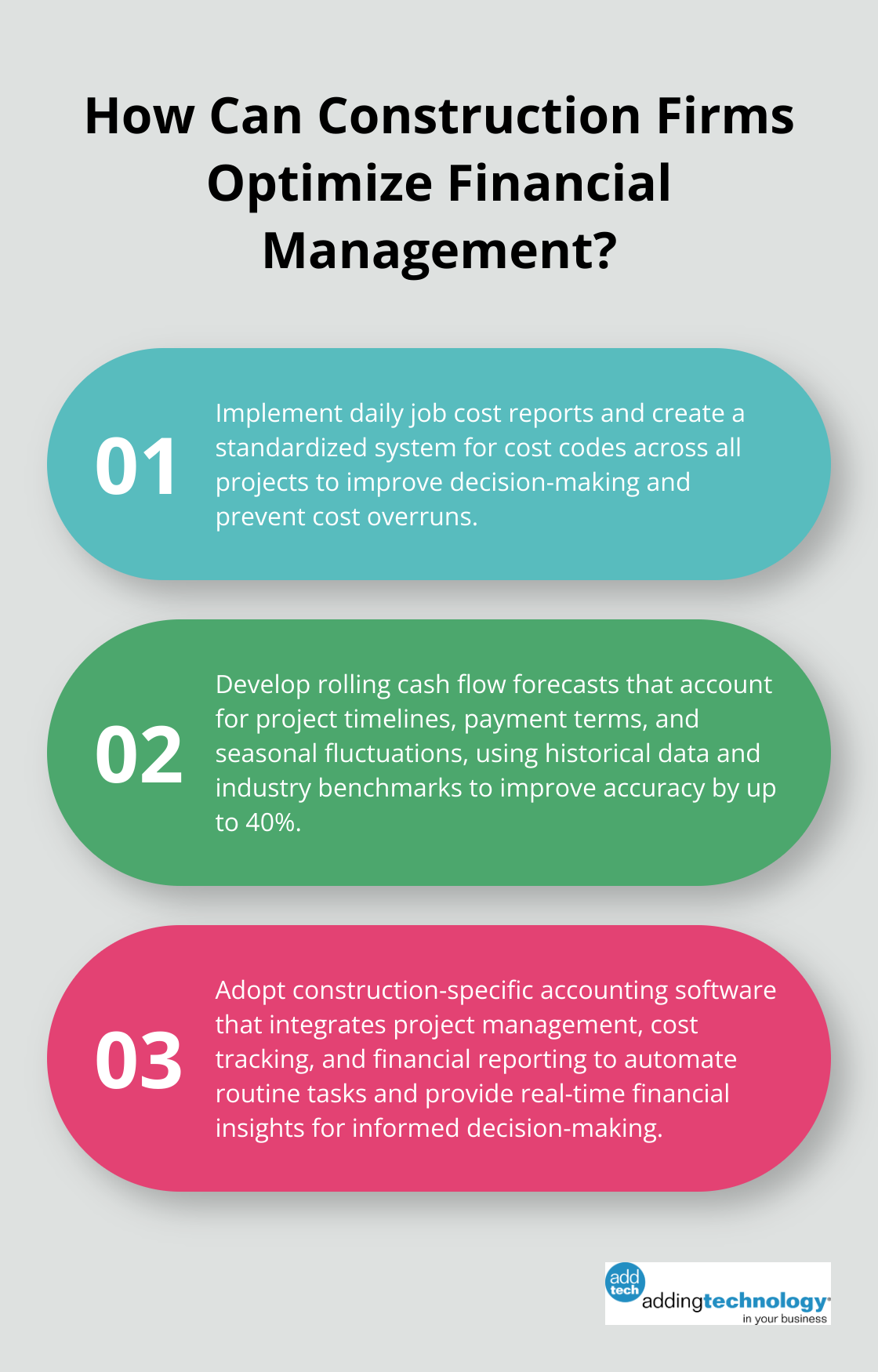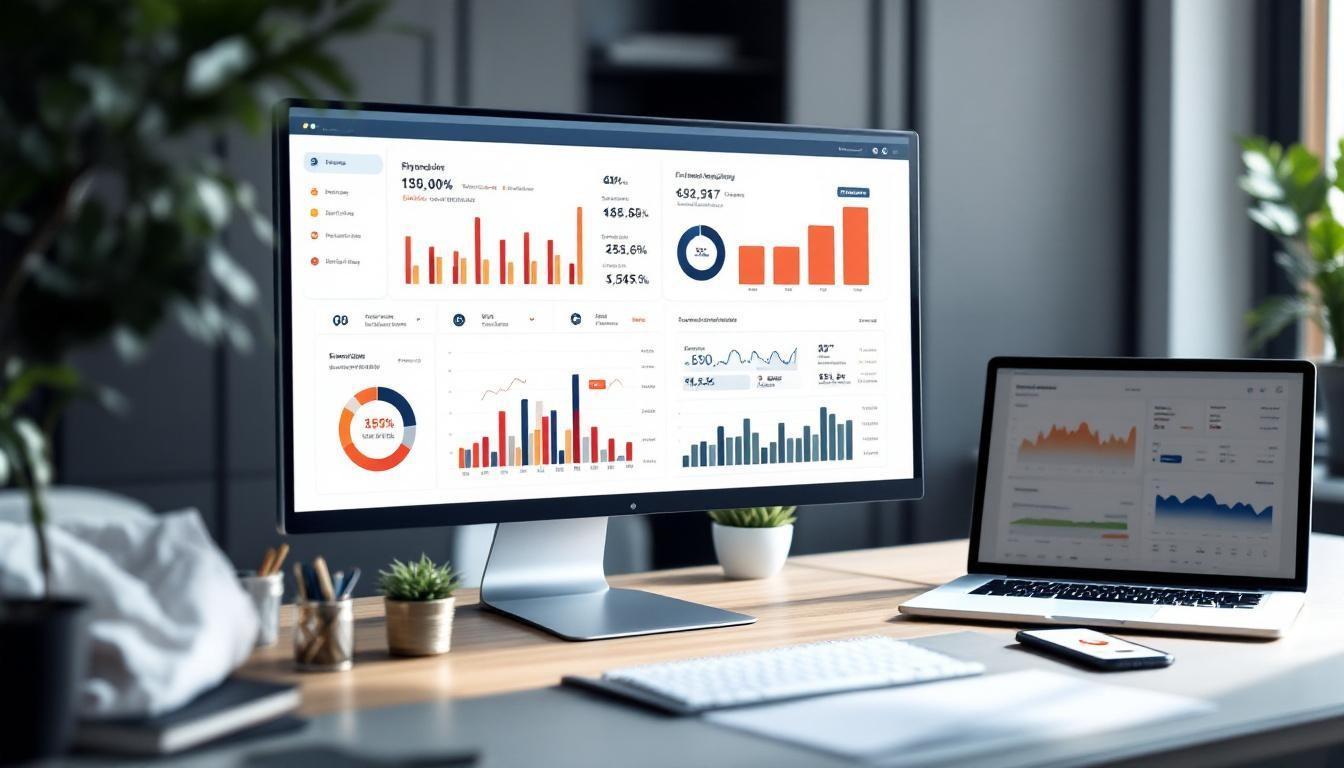
At Adding Technology, we understand the unique challenges of accounting for construction companies. The complex nature of project-based work, long-term contracts, and multiple stakeholders can make financial management a daunting task.
In this post, we’ll explore essential accounting practices and technological solutions that can streamline your construction company’s financial processes. We’ll show you how to tackle job costing, progress billing, and cash flow management effectively.
Construction companies operate on a project-by-project basis, each with its own budget, timeline, and financial considerations. This structure requires meticulous tracking of costs and revenues for individual projects. Many contractors struggle to maintain accurate records across multiple job sites, which leads to financial discrepancies and potential profit loss.
Long-term contracts complicate revenue recognition in the construction industry. The American Institute of CPAs (AICPA) reports that improper revenue recognition is a leading cause of financial restatements in construction. The percentage-of-completion method is used when a job will likely take at least two years to complete from the contract’s start date, providing a more accurate picture of a company’s financial health over time for most projects.
Allocating costs across multiple projects challenges many construction firms. Overhead expenses, equipment usage, and labor hours must be carefully distributed to avoid under or over-charging clients. A study by the Construction Financial Management Association found that companies implementing robust cost allocation systems see an average of 15% improvement in project profitability.
Relationships with subcontractors and suppliers add another layer of complexity to construction accounting. Late payments, change orders, and disputes can disrupt cash flow and project timelines. Improving project management practice is suggested as one means of achieving cost effectiveness in construction. Clear communication channels and standardized processes streamline these relationships.
Modern construction accounting software (like those offered by Adding Technology) addresses many of these challenges. These tools integrate project management, cost tracking, and financial reporting into a single platform. Construction-specific software can improve accuracy, reduce manual data entry, and provide real-time insights into project financials.

As we move forward, we’ll explore essential accounting practices that help construction companies tackle these unique challenges head-on. From job costing to cash flow management, these strategies form the backbone of successful financial management in the construction industry.
Job costing forms the foundation of construction accounting. It requires accurate tracking of costs for each project, including labor, materials, and overhead. Job costing is instrumental in assessing each project’s financial performance and ensures that projects stay on track financially.

To excel at job costing, create a standardized system for cost codes across all projects. This consistency allows for easier comparisons and trend analysis. Implement daily job cost reports to catch discrepancies early. Real-time job costing significantly improves decision-making processes and helps prevent cost overruns.
Progress billing maintains steady cash flow throughout long-term projects. It involves billing clients at predetermined milestones based on the percentage of work completed. The construction sector often faces unique obstacles that can disrupt cash flow, leading to delays, increased costs, and, in severe cases, business failure.
Retainage (typically 5-10% of the contract value held back until project completion) requires careful management. Track retainage separately in your accounting system and factor it into cash flow projections. Negotiate fair retainage terms upfront to avoid financial strain.
Construction equipment represents a significant investment. Proper depreciation and leasing strategies can have substantial tax implications. The Internal Revenue Service allows for various depreciation methods, including the Modified Accelerated Cost Recovery System (MACRS), which can provide tax benefits.
For leased equipment, carefully evaluate whether operating or capital leases are more advantageous for your financial situation. Many contractors find that a mix of owned and leased equipment provides the best balance of flexibility and financial efficiency.
Precise cash flow forecasting is vital in an industry known for its volatility. The Construction Industry Institute reports that companies with robust forecasting practices are 25% more likely to complete projects on budget.
Develop rolling cash flow forecasts that account for project timelines, payment terms, and seasonal fluctuations. Use historical data and industry benchmarks to improve accuracy. Advanced forecasting techniques can reduce cash flow surprises by up to 40%.
Modern construction accounting software addresses many industry-specific challenges. These tools integrate project management, cost tracking, and financial reporting into a single platform. Construction-specific software can improve accuracy, reduce manual data entry, and provide real-time insights into project financials.
As the construction industry continues to evolve, staying ahead of financial management trends becomes increasingly important. The next section will explore cutting-edge technological solutions that are revolutionizing construction accounting practices.
Construction-specific accounting software transforms financial management for many firms. These platforms address unique challenges of project-based accounting, offering features like job costing, progress billing, and equipment tracking in one place. The Construction Accounting Software Market is projected to hit USD 2.26 billion by 2029 at a 7% CAGR, indicating significant growth and adoption in the industry.

Adding Technology’s accounting solutions exemplify this trend. They provide contractors with tools that integrate seamlessly with existing workflows. These systems automate routine tasks and provide real-time financial insights, allowing construction professionals to make informed decisions quickly. This reduces the risk of cost overruns and improves overall project management.
Cloud-based tools revolutionize how construction teams collaborate on financial matters. These platforms provide a single source of truth for company data, significantly reducing the likelihood of mistakes. Project managers can now approve expenses or review budgets on-the-go, which ensures that financial processes keep pace with the rapid nature of construction work.
The ability to update and access financial information instantly reduces delays in decision-making and improves cash flow management. Cloud technology enables real-time access to project data from any location, which facilitates better communication between office staff and on-site teams.
Mobile apps for time tracking and expense reporting have become essential tools in the construction industry. These applications allow workers to log hours and submit expenses directly from the job site. This eliminates the need for paper-based systems and reduces errors in data entry.
The integration of these mobile solutions with core accounting systems achieves near real-time visibility into project costs. This level of insight allows for proactive financial management, which enables firms to address issues before they escalate into major problems.
The construction industry’s adoption of these technological solutions indicates a significant shift towards more efficient and accurate financial management. These tools continue to evolve and promise to further streamline operations and boost profitability for construction firms of all sizes.
Companies that embrace these technological advancements (such as those offered by Adding Technology) position themselves at the forefront of the industry. They benefit from improved accuracy, efficiency, and decision-making capabilities in their financial management processes.
Accounting for construction companies requires specialized approaches and tools to address unique industry challenges. Job costing, progress billing, equipment management, and cash flow forecasting form the foundation for accurate project tracking and informed decision-making. Modern software solutions, cloud-based tools, and mobile applications revolutionize financial management in construction, offering real-time insights and automating routine tasks.
Adding Technology offers tailored solutions that address the specific needs of the construction industry. Our expertise in construction accounting, combined with cutting-edge technology integration, empowers contractors to focus on their core business. We ensure financial stability and compliance for construction companies of all sizes.

The construction industry continues to evolve, and staying ahead in financial management proves essential for success. Companies that embrace specialized accounting practices and innovative technologies build a solid financial foundation (improving operational efficiency and driving sustainable growth). Investing in robust accounting processes and technologies secures a company’s financial future in the dynamic world of construction.









At adding technology, we know you want to focus on what you do best as a contractor. In order to do that, you need a proactive back office crew who has financial expertise in your industry.
The problem is that managing and understanding key financial compliance details for your business is a distraction when you want to spend your time focused on building your business (and our collective future).
We understand that there is an art to what contractors do, and financial worries can disrupt the creative process and quality of work. We know that many contractors struggle with messy books, lack of realtime financial visibility, and the stress of compliance issues. These challenges can lead to frustration, overwhelm, and fear that distracts from their core business.
That's where we come in. We're not just accountants; we're part of your crew. We renovate your books, implement cutting-edge technology, and provide you with the real-time job costing and financial insights you need to make informed decisions. Our services are designed to give you peace of mind, allowing you to focus on what you do best - creating and building.
Here’s how we do it:
Schedule a conversation today, and in the meantime, download the Contractor’s Blueprint for Financial Success: A Step by-Step Guide to Maximizing Profits in Construction.” So you can stop worrying about accounting, technology, and compliance details and be free to hammer out success in the field.